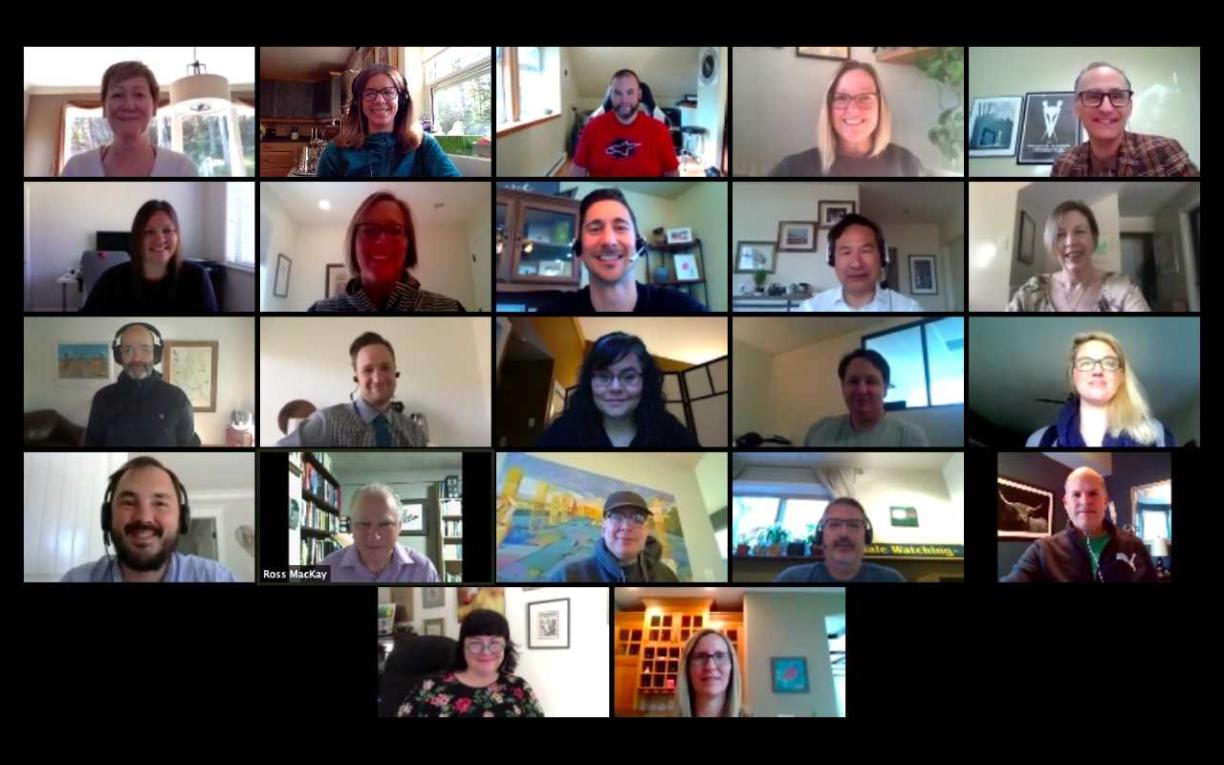When emergencies come knocking at Vancouver Island University’s door, the Emergency Operations Centre (EOC) is activated to respond and make sure that all aspects of the institution are considered as the situation evolves. Its structure and operations follow best practices outlined by Emergency Management BC. It remains operational until members of the EOC deem that the emergency has been resolved. The timeline for the length of the EOC activation is as variable as each emergency is unique. In the case of COVID-19, the EOC has been active for three weeks and counting.
How does the EOC work?
It is led by an EOC Director, which is the Director of Enterprise Risk Management for COVID-19, and is run by the Health and Safety Office. Depending on the situation, the EOC will be called together immediately, or its members may be put on notice that it could be called. When the EOC is called, it becomes the immediate priority of all of the EOC members. Members must be available at all times while the EOC is active. In response to the pandemic, the EOC met daily until March 27 and has now moved to a Monday, Wednesday, Friday schedule.
How did the EOC respond to COVID-19?
Erin Bascom, Health and Safety Advisor, was monitoring the COVID-19 situation carefully for many weeks prior to the escalation, and called the EOC team members together for an information session to prepare for the possibility of an escalation and to put all members on notice. When the COVID-19 crisis met VIU’s criteria for an emergency (these criteria are unique to each situation), the EOC became active.
What is the goal of the EOC?
Each emergency dictates different goals. In the case of COVID-19, it is to ensure the health and safety of our students, employees and the public; support academic quality and continuity; provide business continuity for essential services, as well as to address the urgent situation the virus created for our community members who are spread around the world.
The immediate issues the EOC dealt with during the first days of activation ranged from calling students and employees abroad back to Canada, assisting our international students in getting back to their home countries, supporting and implementing the decision to go to an alternate delivery model to complete the semester (in close consultation with the provincial government), the decision to move as many employees as possible to a work from home model, building closures, event cancellations, cleaning protocols, IT supports and how to communicate all these rapid changes to our community members. VIU also had an important role to play in communicating government announcements and ensuring the information we provided to our community was truthful when so many conflicting reports were emerging.
Who is on the EOC and how is it structured?
The EOC is made up of subject matter experts from across VIU’s faculties and departments to ensure all areas that could be affected by an emergency are accounted for. COVID-19 impacts have been felt across the entire institution and touched every program we offer, so all members have been fully involved. Not all members are required for every emergency and additional members may be added depending on need.
The EOC team for COVID-19 has representatives from IT, Communications, Finance, Human Resources, the Academy, the Library, the Centre for Innovation and Excellence in Learning (CIEL), Student Affairs, Residence, Research, Facilities and Security, Risk and Safety, Ancillary Services and International Education who understand and report on the requirements of their area.
Recommendations to manage and address the impacts of the situation are made to the Policy Group, which includes the institution’s senior leaders – the President, the Provost and Vice-President Academic, the CFO and Vice-President Administration, the Associate Vice-President of Human Resources, the Chief Advancement Officer and the University Secretary. Recommendations can be accepted, rejected or sent back for further investigation.
As part of the COVID-19 EOC response, a number of subcommittees were created to respond to specific issues that arose such as academic continuity, travel, housing and IT challenges. The committees bring forward recommendations to the EOC and/or the Policy Group. The Academic Continuity Committee is one of these committees and their role is to provide advice on educational continuity and to address policy issues around registration, grading, course completion and hardship students face brought on by the pandemic.
The Policy Group reviews recommendations made by the EOC on the same day. The Director of the EOC acts as a conduit between the two groups. The Director of the COVID-19 EOC is Rob Okashimo, Director, Enterprise Risk Management. The goal of the Policy Group is to provide a timely response to strategic and university-wide decisions for immediate action by the EOC and its sub-committees.
If you have any questions about how the EOC has worked during this emergency, please contact Safety@viu.ca.





